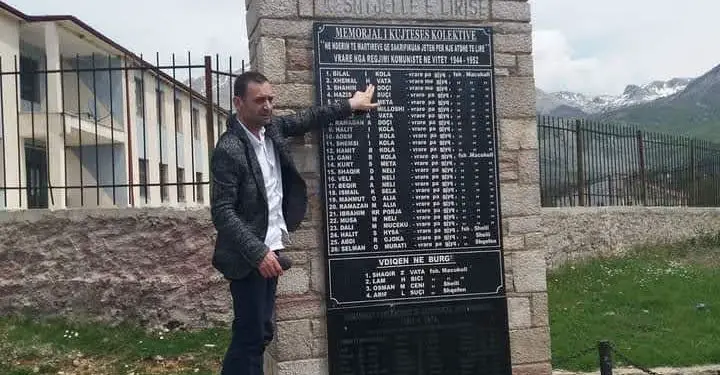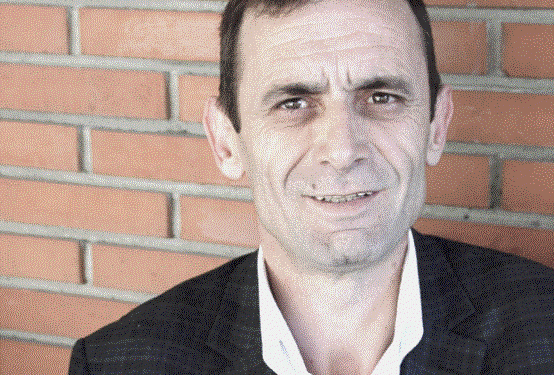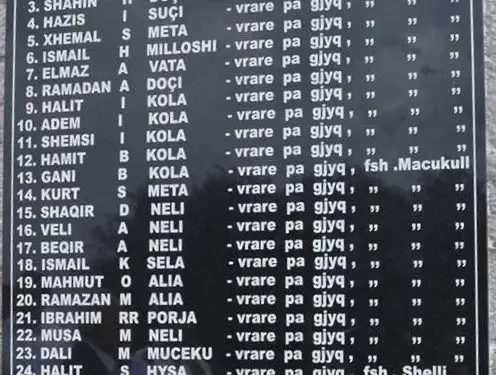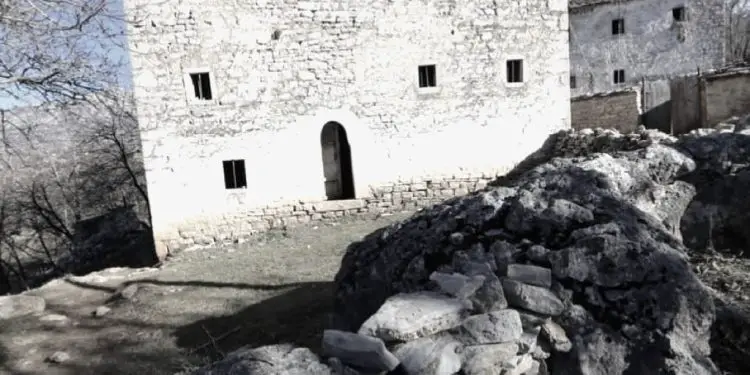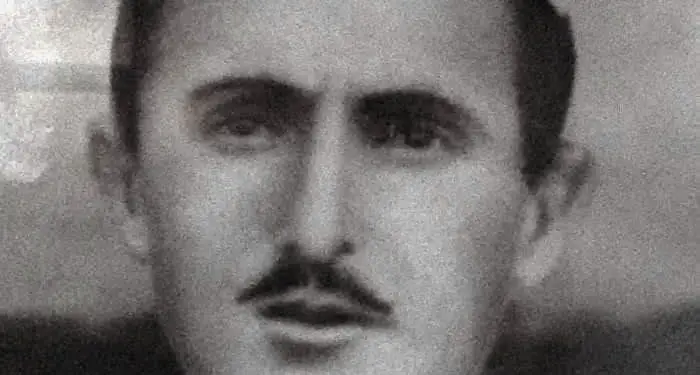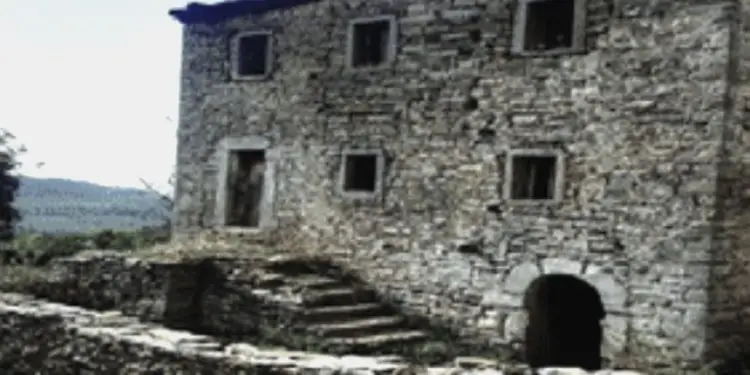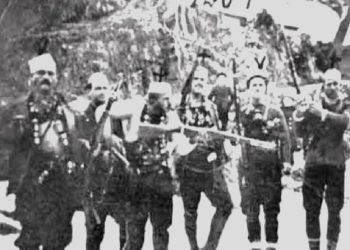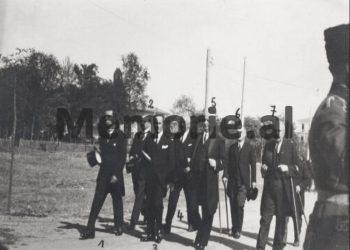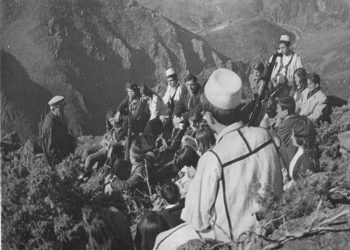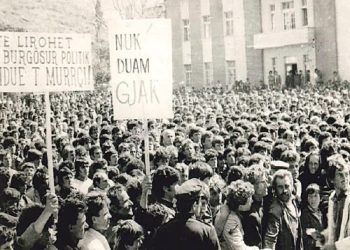By Ilir Vata
Memorie.al / The biggest armed clash between the nationalists and Shefqet Peçi’s gang in Macukull, was left in oblivion for 25 years, an insidious attempt to hide the reality, a political cynicism, to fade anti-communism and profit in democracy , the very things that served communism, a darkness for historical reality, alienating history, as it used to be in the dictatorship. Still the martyrs who were executed in the dictatorship do not have a grave to honor, as they deserve, because still the old hatred, born from the sins of the dictatorship, is alive, powerful and seeks to undo the values of a province whole, in her quest for freedom.
The first anti-communist battle in Macukull i Matit, started in July 1944 and has been forgotten for these years not without purpose, but to minimize, devalue all the anti-communist values of Macukull and the surrounding areas. In this trap, the entire anti-communist history in the country has fallen, due to the lack of transparency with the real history, and until today, the alienated history is god, even contrived pieces of history have been added, which make it even further, the real history itself, throughout Albania.
To shed some light; Of course, the nationalist forces representing King Zog resisted where they could and efforts were made in Tropoja, at Dragobija bridge, in Kruja and its surroundings, with a former Zog officer, gendarme and nationalist, in the Madhe Highlands in 1945. The battle of Muharrem Bajraktatri and his resistance, as well as the Postriba Uprising, after the advent of communism, but the battle of Macukulli is unique in Albania.
Macukulli has historically been run by first houses, good houses, on the basis of seniority and guided by the “Skënderbeu Canon” mainly, since in general, the “Lekë Dukagjini Canon” and the local laws of Macukulli prevailed. Power in Macukull was possessed by plebiscite, through the elders, that is, by the people, through their representatives, while the law was implemented by the powerful houses, which also played the role of legislators.
Macukulli, a land that was never conquered, countless battles like the one against the Serbs in Shkalla e Deshve, or the great battle of Kurdaria, which was led by Haziz Vata, the battle against the Ottomans, Serbs and every invader, that is, a castle, which it never fell, not even in the last battle with communism.
The history of the post-dictatorship left Macukulli in the shadows even from a historical perspective, without investments, without roads and without a mosque, so today it is almost abandoned, but what is important, the history of this country is known to everyone, it is sung in the surrounding lands and beyond, but still no light has been shed, even those few things have faded, alienated, for the interests of individuals, they have even decorated people without values, when the true values are still buried.
In the center of Macukull, there is a story that goes beyond the limits of the legend, but which is reality, because right in the middle of this sad piece, live the stories of the first two houses, Kola and Vata, already known beyond the borders of Matit, even throughout the country. Indeed, they were a big house, with other brothers, Kola and Vata, but as the years passed, they became opponents, who changed even the Canon of Lekë Dukagjin with their own tradition, even that of Skanderbeg.
In fact, in Macukulli, it was run by the first houses, which challenged Zogolli, the governments of the time, i.e. they were self-governing, and proof of this challenge to Zogolli, who exercised the power of the Ottoman invaders, was recorded in 1879, an event of national proportions after the parish of Macukulli and the Semti of Prelli, had decided to challenge the order of the empire that was exercised through the family of Zogolli, to collect the arms of Mati and at the center of this event, was Zenel Vata, with the surrounding province.
Two gold heybes of Ali Pasha Tepelena, went to Macukull
When Zogolli, a paid employee of the Ottoman Empire, asked to collect weapons from the Matjans, Zenel Vata, the son of Ali Vata, who was Ali Pasha Tepelena’s advisor and war strategist, when Ali Pasha Tepelena fell ill, called Zenel, to son, to hand over his father to rest in Macukull, according to Ali Vata’s own request.
Zeneli goes to pick up his father and archival documents prove that; Ali Pasha Tepelena, gave him two heybes of gold, for his father’s contribution and as a reward and help, for Macukullin himself. Zeneli, after burying Ali, (who was suffering from an incurable disease), began to follow in his father’s footsteps and take the legacy of Ali Pasha Tepelena to the country, when he told him “Don’t waste your money, do something for your country and the glory of your tribe, that Ali Vata was a leader and warrior”. Zenel Vata, with the money Ali Pasha Tepelena gave him, laid a cobblestone for the village, from Dukagjini (Shenkolli Pass, to Macukulli Pass) and today it is called; “Cobblestone of Vatdoda” and is kept in good condition.
With the rest, he started to build an irrigation channel, but his request for 20 kg of corn per year was not agreed to, because the Macuklans considered it a tribute, thanks to the influence of strong tribes and the stubbornness of each Macuklan, which agree to be equal and not subordinate. Zeneli, with the remaining money (from the investment for Macukull’s water supply), bought weapons and armed people, at the very time when Zogolli (Amet Zog’s family), under the Ottoman pashalak, had started the campaign to collect weapons in Mat, even with strength.
Zeneli gathered the men of the Semt i Prelli province and went to Lis bazaar (near Zogolli sarai) and called on the men of the Semt i Prelli not to hand over their weapons, he even called “Macukull headquarters, on one side”! “We never surrender our weapons…”! Even today, songs are sung about this great work of Zenel Vata. Zogolli, out of jealousy of power, prepared a trap to kill Zenel Vata and so it happened, Zenel Vata died and was mourned by Kolaj and Vataj all around, with honors, like a giant of endurance, because that’s what he was.
Later, the Vatdodai targeted Zogolli, Dali Vata with his nephew Koka and the other nephew, Xhetani, entered the palace. Prince “Sakati” welcomes them kindly, and even tells the servants; “bring figs and coffee”, but the Vatodaj did not accept (if they ate them or drank coffee, according to custom, they did not retaliate). “I don’t want figs and coffee, we came to exchange two words”, he is shot with a gun, leaving him in charge; “Thank you, Zenel Vata”, and “Prince Sakati”, the mastermind behind Zenel Vata’s murder, is killed. An enmity that died out, with the arrival of King Zog in power, even his foresight, was great, that Vatodait, took them all as soldiers and they were his supporters, during the entire power of the Kingdom.
Some of the tragedy:
Kola and Vata have been at mutual enmity for centuries, but unlike other clashes between tribes, according to the canon, they did not only talk when they killed, but they did the killing together, they even cried and praised each other, just like brothers, as they were.
With a horse or not, they did the honors between the parties and again peace and then war, but again the killed, they were honored together, a manhood that goes beyond the limits of faith, the canon, and so for centuries, the battle between them did not stop, but again together they made pacts, to fight against foreigners, battles, plans and strategies, always together and always like two headstrong brothers, as in the last war, which is remembered against communism, in July of 1944, they were the strategists of the battle, with Bilal Kola and Xhemal Vata at the epicenter, together as always.
But Macukulli, although it had in its epicenter the two large tribes of the first houses, functioned as a whole, because at the northern end of Macukulli, in the “Kalivaç” neighborhood, lived another enlightened tribe, Koka (house of the mind), a little further inside Macukull, Cuka, maybe this is the tribe that settled first in Macukull and brought Kola and Vata, and their brother, Gjegja. At the other end, on the eastern side, lived other tribes, such as: Uka e, further inland (Vojvoda) of Macukulli, Gjici, Cani, Muceku, Bukaci, Doda.
But in the heart of Macukulli, there was another stubborn tribe, the first house, Saldoçi, and together with other tribes, they built the Macukulli castle, which will mark history for several centuries. Also, there were; Metaj, Selajt, Bici, Kolaveri, Leka, Gjoka, Pirraci and Beqiri, which were in the center of the village. In the surroundings, another village was noted, that of Shëlli, with Cekajt, in Shtjefa, with Gjta, and the surrounding villages, such as Urxalla, although they were not of Macukulli, were removed and represented with it, like the Muça tribe with Ram Muça, or a little in the edge in Dukagjin, with Dedajt, or Likola.
Even the extreme northern path of Macukulli, there was another village, that of Gjoçaj, who were represented by Pasha, Lala, Koleci, or Gjokola, and at the other end, although further, another bajrak, Lura, who was represented by; Menen, Gjoçin and other first houses. In the part of the restriction with Dibra, another three, Katër Grykë, which was a great support and protector of values, represented with Biba, Bodin and a little further, the big family of Dine Hoxha. In the representation of Macukli, the tribes from the anti-communist village of Derjan, with Xhetan and Lal Krosi, and a little further, in Prell, with the Sulkurtaj and, followed by Brahelikaj and Canametaj, were intermingled. Like Macukulli, he was among the values of giving the best, for the values of his own country and those of the entire province.
Why is Macukulli’s anti-communist battle unique in Albania?
The first: it is the first self-organized battle by the Macuklans, without anyone’s influence, and it marks the first anti-communist rifle, in an organized army. Unlike the other foci, which were directed by the King’s forces, Macukulli organized the war against communism by itself, with the first houses and the Macuklans themselves and the villages in the district, because a large number of people educated abroad, who were also officers of King Zog, they knew that communism was an autocratic system and the Macuklans did not tolerate any regime other than plebiscite, so they considered communism as an invader.
The second: Macukulli had direct connections with the West, and the diplomat was Bilal Kola, who also implemented the aid pact against communism, and most importantly, the battle was planned with a military strategy. In the first meeting held at the beginning of the summer of 1944, when preparations began to host communism with war, it was considered as an invader from the very first meeting.
The meeting was open, among the leaders of the country, where, in addition to the representatives of the tribes from Macukulli and the surrounding areas, there were also Bilal Kola, Xhemal Vata, Sali Vata, Taf Vata, Shahin Doçi, etc. After long discussions, it was decided that; Communism was considered as a new invader, who wanted Macukullin, to bring him to his knees, and it was decided to arm even those tribes that did not have weapons or the opportunity to buy them, as well as to call all the officers into battle. , gendarmes, etc., to become part of the battle and have a complete military strategy.
From the testimonies of contemporaries, it is said that; Bilal Kola, a military strategist with extraordinary intuition and intelligence, which was rare at that time, proposed to be the commander of this war, the bravest man, Xhemal Vata, who would represent the largest group of fighters, while Bilal Kola himself, to be with a more specialized team, where he would patrol the territory, and even control, up to the north-eastern part of Macukulli. Bilal Kola, was someone with extraordinary influence, a diplomat, the man who maintained ties with the most anti-communist leaders, throughout the country, even his relations crossed the borders, because he was the man who had direct ties, even with the English mission and the forces anti-communist, in the West.
Military strategy, for the battle against communist forces
Sali Vata, former deputy commander of the Border for Shkodra, at the time of King Zog’s Monarchy, promised a mortar and together with the first marker, Llan Gjatan from Shqefni, would lead the group of machine guns, on the main hill of Macukull, or in the epicenter, where it was thought that the concentration of the army expected to arrive, directed by Shefqet Peçi, would be. Xhemali Vata, with more than 180 buras, would cover the entire possible parallel of Macukulli, while Bilal Kola, with the rest of the specialized soldiers, would patrol the northeastern area and patrol to achieve the possible scheme of an armistice, of the detachment of Shefqet Peç.
Only three days later, they were informed that Shefqet Peçi, at the head of his staff, had approached Macukulli, where in the Shënkolli Pass (where the Assembly of Dukagjin was held) there was a group represented by; Ram Muça, Kros Vata, Must Vata, Murat Vata and the tribe of Deda, in the village of Gjat, Dukagjin and Pashajt, in Gjocaj. Shefqet Peci’s platoon was divided into two teams with a large number of soldiers, one from Dukagjini which was received by the machine gun of Kros Vadoda and the other part on the slope of the Nepa slope which was received by the Shellinjak as a vanguard group and then from Sali Vata’s mortar with Llan Tjätas markers.
Bilal Kola’s vanguard group had made their way to Vig, (village east of Macukulli), where it was learned that the crack path might be, but Bilal, an experienced strategist, smelled the trap and was later informed that the forces needed concentrated in the middle of Macukkulli and join forces, in a fierce battle, until Shefqet Peçi was ashamed. The anti-communist battle of Macukulli was of a unique type and even with rifles and mortars against communism, the consequences that would weigh on that village, after the installation of communism, because the group of Blial Kola disappeared without a trace from the dictatorship of Enver Hoxha and not a little, but thirteen men shot.
From Vatodaj, Xhemal Vata was shot (on the same day as Sali Llani and Ismahil Hysa, in 1947), while Sali Vata, a mortar man (the former companion of Medi Bey Frashri), was sentenced to 101 years in prison, Taf Vata, was sentenced to 25 years in prison, Shaqir Vata, 25 years in prison, Haziz Vata, (the young man) was later imprisoned, Nezir Vata, was imprisoned and tortured, for eight months, in Burrel and Dibra prisons, where he saw Xhemal Vata , when they killed him in sight.
Neziri, before he died, said that; “…They took me out of the firing line, where Xhemali, Sali Hysa (my wife’s brother) and Sali Llani, my brother’s friend, Mesim Vata, were. One of the riflemen grabbed me by the collar and said; look at the dogs, how the puppies are shot, who went against the government, those who are against communism. Open your eyes well, because it’s your turn…’! The riflemen fired volleys; Saliu and Sala fell, while Xhemali fell to his knees, but did not fall. They shot him again and he did not fall. Then one of them pushed him with his foot.”
And while he was in tears, when he was telling, (he was 85 years old), Neziri described Xhemal, where he said; “He was a tall man, about two meters, broad shoulders, big feet who rarely found opinga and arms like pillars, he spoke little, but he often decided, brave, who is not born even for centuries”. While in the tribe of Saldoçe, Xhemal Doçi was shot and then exiled from Suchajt, Bicajt, there were victims, and then persecution and many other families.
The battle of Macukulli was well organized with Bilal Kola, Sali Vata and Xhemal Vata as the leaders and all the officers and gendarmes of that time, even the militiamen, who served for a while. There were planhet – placement, control of opponents, light and heavy weapons, rifles, aromatics, machine guns, and even mortars. There was a large number, over 250 armed men, and a whole village, ready for battle, strategy in distribution, with vanguards, scouts, preliminary ambushes, and concentration of forces, until the defeat of Shqefqet Peç’s army.
The anti-communist Macukulli won the battle with weapons against communism, it was even the first battle of this magnitude, that is why it is rare and should be studied, for the values of resistance it holds, but it recognized an unprecedented persecution, for 45 years, rare were those families, who could send a child to high school, the working day, was 10 old lek, total poverty, inability to live, a part of the macukkllons, and even the surrounding area, worked in the mine, where many have lost their lives, others died from silicosis.
Many families were exiled, expelled, seized and kept under surveillance, until the fall of the dictatorship, there were also those few people who served the regime and became tools to bury the good houses and subsequently, people were imprisoned, even one Hamit Kolaveri, who was until the end of his life, a promoter of the overthrow of the communist government, was among those who suffered. It is difficult to write about Macukulli, and to do so, because Macukulli is a tower on its own and with white light, as well as the towers themselves, Macukulli with its values, because it works together, as a whole.
Everyone in Macukull was under the eye of the State Security, oppressed and as a village, it was seen by the dictatorship as a trapped tower and the communist revenge, it never stopped, without distinction for everyone, as much as these 25 years, it is seen by the power of the neo-dictatorship, with a silent hatred, because he was the guiding bastion of the anti-communist resistance. Memorie.al




